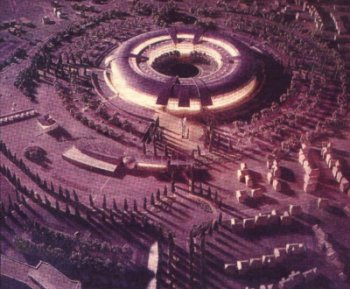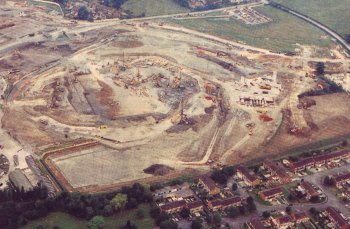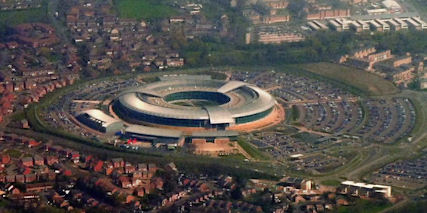 The Top-Secret Government Spy-base of GCHQ (Government
Communications Headquarters) is situated in Cheltenham,
England. (approximately 5 miles from Cosmic Conspiracies HQ)
The Top-Secret Government Spy-base of GCHQ (Government
Communications Headquarters) is situated in Cheltenham,
England. (approximately 5 miles from Cosmic Conspiracies HQ) G.C.H.Q.
The UK's Top Spy Base
 The Top-Secret Government Spy-base of GCHQ (Government
Communications Headquarters) is situated in Cheltenham,
England. (approximately 5 miles from Cosmic Conspiracies HQ)
The Top-Secret Government Spy-base of GCHQ (Government
Communications Headquarters) is situated in Cheltenham,
England. (approximately 5 miles from Cosmic Conspiracies HQ)
This
base is undergoing a complete redevelopment which is costing £330,000,000. These
are the first aerial pictures on the web (EXCLUSIVE TO THIS SITE) showing the
enormous scale of the building work which is currently being undertaken. It is
the biggest single construction project in Europe and will take seven years
until its completion. 120,000 tons of clay will be excavated as they prepare the
foundations for the huge spy base at Benhall, Cheltenham, UK.
When this is complete in September 2000, work will begin to
start pouring 20,000 tons of concrete into the foundations. At present, 3,000
reinforced concrete piles are being driven 50ft into the ground to support the
huge weight of the finished complex. The four-storey £330 million development
will be 70ft high and more than 600ft across.
This will make it bigger than the entire Wembley Stadium complex and the Albert Hall would fit into the hole in the middle of the doughnut. It is rumoured that a laundry, crèche, gymnasium, hairdressing salon, shops, cafes and spacious walkways lined with plants will be included when the building is completed. Another GCHQ site which is situated at Oakley should be empty by 2003. It is earmarked for 500 houses, a supermarket, doctor's surgery, takeaway and a video shop. Another 300 houses will be built at Benhall.
 Spaces around the doughnut will allow for 1,750 cars in concentric
rings and covered parking for 200 bikes. Developers Carillion will install more
than 20,000 tons of glass and inside there will be 90,000 square metres of floor
space. BT will install 3,000 kilometres of fibre optics and 9,000 kilometres of
telephone line. The cooling system will be equipped with 27 kilometres of
chilled beams as part of the cooling system. 30 megavolts of electricity supply
is sufficient to serve a quarter of Cheltenham. It will feed power to one of the
most complex computer systems in the world.
Spaces around the doughnut will allow for 1,750 cars in concentric
rings and covered parking for 200 bikes. Developers Carillion will install more
than 20,000 tons of glass and inside there will be 90,000 square metres of floor
space. BT will install 3,000 kilometres of fibre optics and 9,000 kilometres of
telephone line. The cooling system will be equipped with 27 kilometres of
chilled beams as part of the cooling system. 30 megavolts of electricity supply
is sufficient to serve a quarter of Cheltenham. It will feed power to one of the
most complex computer systems in the world.
Francis Richards, director of GCHQ, said: "This new building will
help us to deliver our vital service to the nation. The building is handsome,
modern and efficient and I'm confident that the town as well as GCHQ will be
proud of it."
Six huge tower
cranes are being brought to the site to move mammoth pieces of masonry and plant
machinery, flooring and roof panels.
Secrecy keeps spy base cost increase under
wraps
The cost of moving GCHQ into its new 'doughnut' office rocketed by 400%, according to a Government report. Parliament's intelligence and security committee said the projected costs of moving into the £543 million building at Benhall had risen by four times the original £60 million estimate.
The spy base's deal with developers Carillion, under the Private Finance Initiative, is the most expensive project ever carried out by the intelligence service, says the report. But because it is shrouded in secrecy some of its key findings have lost their punch at the hands of censors. Instead of quoting the figures, the report states, 'We were told if GCHQ conducted the move in the way it had initially wished it would cost approximately *** million.'
 'However GCHQ revised its transition method and an estimation
of *** million was put to the treasury and cabinet office. 'Further work has
been done and the cost brought down to an estimated *** million. This is four
times over the original estimate.' Ministers have been told to keep a
tighter grip on the project to keep costs from spiralling out of
control. A
GCHQ spokesman said: 'Previous estimates of the cost, risk and timescale of a
move were based on a feasibility study conducted three-and-a-half years ago. 'We
did more detailed study calculated at the end of November 1999. The scale of the
cost increase wasn't known to anyone until then.'
The
report also reveals that staff are to face rigorous mental health checks to
prevent repeats of the embarrassing episode in which a drunken M16 agent left
his laptop in the back of a cab. Tests being developed at GCHQ aim to weed out
those who have 'adverse character traits'.
Prime
Minister Tony Blair came under fire in the report, which revealed a ministerial
committee which sets priorities for M16 and GCHQ had not met for five years. The
spokesman said 'You've got to grasp the size and complexity of the computer
system. It's a major exercise to prepare for the move so the system can be
switched off, taken its new location and switched on again. A commercial
enterprise would probably scrap its existing systems and start again. We're not
in the position to do that from an operational or financial
standpoint.'
'However GCHQ revised its transition method and an estimation
of *** million was put to the treasury and cabinet office. 'Further work has
been done and the cost brought down to an estimated *** million. This is four
times over the original estimate.' Ministers have been told to keep a
tighter grip on the project to keep costs from spiralling out of
control. A
GCHQ spokesman said: 'Previous estimates of the cost, risk and timescale of a
move were based on a feasibility study conducted three-and-a-half years ago. 'We
did more detailed study calculated at the end of November 1999. The scale of the
cost increase wasn't known to anyone until then.'
The
report also reveals that staff are to face rigorous mental health checks to
prevent repeats of the embarrassing episode in which a drunken M16 agent left
his laptop in the back of a cab. Tests being developed at GCHQ aim to weed out
those who have 'adverse character traits'.
Prime
Minister Tony Blair came under fire in the report, which revealed a ministerial
committee which sets priorities for M16 and GCHQ had not met for five years. The
spokesman said 'You've got to grasp the size and complexity of the computer
system. It's a major exercise to prepare for the move so the system can be
switched off, taken its new location and switched on again. A commercial
enterprise would probably scrap its existing systems and start again. We're not
in the position to do that from an operational or financial
standpoint.'
GCHQ announced in 1998 it was going to combine its two bases at Benhall and Oakley into a single office. Work on the project, the biggest in Europe, began in the spring and more than 1,000 workers are on site.
This article originally appeared in 'The Citizen' Newspaper - the local paper for the Gloucestershire Region.
Massive Surveillance Database Planned
Did you know that your government has the capability to listen in on every phone call, e-mail, fax and text you make? The entire English-speaking world is covered by a massive surveillance system which sifts through the mind-bogglingly large movements of data and communications every day. The largest computers in the world, stationed at the headquarters of inter-connected agencies such as the NSA, GCHQ (in the UK), DSD (in Australia, CSE (in Canada) and the GCSB (in New Zealand), listen in to just about everything. Their remit: anti-terrorism, external and internal threats, and sometimes they operate to counter threats to the economies of these countries.
 A
recent announcement takes this
surveillance a step further. Britain is
already the surveillance capital of the
world. We have closed-circuit TV
everywhere (a simple trip to the shops
might see you on security cameras a
dozen times or more), and the Government
has strong powers to obtain information
at will to protect our national
interests. In general, this situation is
accepted, even welcomed by the British
public. After all, we don't like
terrorists, and have lived with the
threat of terrorism for almost 40 years
(the IRA kicked this off for us a long
time ago, although, thankfully, peace in
the Province has been restored).
A
recent announcement takes this
surveillance a step further. Britain is
already the surveillance capital of the
world. We have closed-circuit TV
everywhere (a simple trip to the shops
might see you on security cameras a
dozen times or more), and the Government
has strong powers to obtain information
at will to protect our national
interests. In general, this situation is
accepted, even welcomed by the British
public. After all, we don't like
terrorists, and have lived with the
threat of terrorism for almost 40 years
(the IRA kicked this off for us a long
time ago, although, thankfully, peace in
the Province has been restored).
In the USA, the subject is more sensitive, as the surveillance of the American people arguably runs against the freedoms granted by the Constitution of the United States. But in these difficult times, Homeland Security is King. Americans are subjects of the State in practical terms, if not on paper.
So what we in the UK do today, the USA will do tomorrow. This is a bald fact: our security agencies are literally joined at the hip.
In the case of this new legislation, we will see the setting up of a massive database to store records of every phone call and e-mail EVER SENT. The UK Government stops short of storing the content, but the dates, times and recipients of the calls will be logged and kept at the Government's discretion indefinitely. (They are already held for a year or two).
"Jacqui Smith [the Home Secretary] has set out plans to give the police and security services more powers to gather phone and e-mail data. The home secretary said police risked losing the ability to fight crime and terrorism without new laws. Reports suggest the government wants a single database to store details of every UK phone call and e-mail sent.
"Ms Smith stressed the "content" of e-mails would not be stored but she said consultation would be launched in the New Year on what the new laws would be. Plans to collect more data on people's phone, e-mail and web-browsing habits are expected to be included in the Communications Data Bill, due to be introduced in the Queen's Speech in November." (Credit: BBC News 15/10/08)
They say you can tell a lot about someone from their friends. That's the idea here: calls or e-mails made to, or received from, dodgy characters will inevitably flag you up as a potential enemy of the State. Perhaps the system may run like a Credit Rating system. Once you communicate with too many ne'er-do-wells, your card may be marked by the security services for more intense monitoring.
Scary? Well, for better or for worse,
it's coming to a security agency near
you REAL SOON!